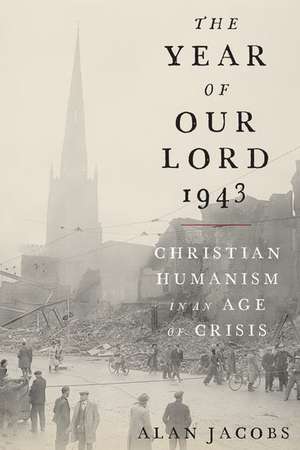The Year of Our Lord 1943: Christian Humanism in an Age of Crisis
Autor Alan Jacobsen Limba Engleză Hardback – 27 sep 2018
By early 1943, it had become increasingly clear that the Allies would win the Second World War. Around the same time, it also became increasingly clear to many Christian intellectuals on both sides of the Atlantic that the soon-to-be-victorious nations were not culturally or morally prepared for their success. A war won by technological superiority merely laid the groundwork for a post-war society governed by technocrats. These Christian intellectuals— JacquesMaritain, T. S. Eliot, C. S. Lewis, W. H. Auden, and Simone Weil, among others—sought both to articulate a sober and reflective critique of their own culture and to outline a plan for the moral and spiritual regeneration of their countries in the post-war world.In this book, Alan Jacobs explores the poems, novels, essays, reviews, and lectures of these five central figures, in which they presented, with great imaginative energy and force, pictures of the very different paths now set before the Western democracies. Working mostly separately and in ignorance of one another's ideas, the five developed a strikingly consistent argument that the only means by which democratic societies could be prepared for their world-wide economic and political dominancewas through a renewal of education that was grounded in a Christian understanding of the power and limitations of human beings. The Year of Our Lord 1943 is the first book to weave together the ideas of these five intellectuals and shows why, in a time of unprecedented total war, they all thought itvital to restore Christianity to a leading role in the renewal of the Western democracies.
Preț: 142.75 lei
Preț vechi: 183.96 lei
-22% Nou
27.32€ • 29.69$ • 22.97£
Carte disponibilă
Livrare economică 19-25 martie
Livrare express 15-21 martie pentru 69.12 lei
Specificații
ISBN-10: 0190864656
Pagini: 280
Dimensiuni: 147 x 213 x 25 mm
Greutate: 0.41 kg
Editura: Oxford University Press
Colecția OUP USA
Locul publicării:New York, United States
Recenzii
...the book offers an accessible introduction to the thought of five major twentieth--century intellectuals, each of whom has been the subject of a daunting amount of writing. It also succeeds in conveying some of the anxieties, preoccupations and experiences of British and French Christian intellectuals in wartime.
Jacobs's fascinating and important book ... offers a rich resource for anyone who wishes to think seriously about the way in which Christians can engage their societies in the face of the current crises they encounter.
an excellent work revealing great erudition yet doing so with a writing style that could do credit to a New Yorker piece.
Reading Alan Jacob's super little book is like prizing open the back of a watch to study the mechanism within: tiny cogs working in clever order, designed by a master craftsman. The cogs are several Christian thinkers whose lives and thoughts connected in 1943.
This elegant book examines his efforts along with those of W.H. Auden, T.S. Eliot, Jacques Maritain and Simone Weil... There were substantial differences in how each responded to the challenges of their times. Jacob traces these while keeping what united them in view; a difficult task that he accomplishes with aplomb.
This is an interesting book about Christian humanism in an age of crisis, specifically during the Second World War.
The Year of Our Lord 1943 is a fascinating and insightful reflection on intellectuals' reaction to perceived crisis. In their literary, philosophical, journalistic and private writings, Eliot, Weil, Maritain, Auden, and Lewis expressed their fear that humanity was approaching a destructive crisis of its own making. The book's elegant style and gripping prose linger with the reader, along with a persistent reflection on the desirable and possible intellectual reactions to contemporary man-made crises, and on the human moral values worth preserving as a guidance for the future.
Jacobs's biographical method is, in many ways, the star of the show. Letting his characters' voices weave themselves together, Jacobs aptly pulls them into common points of reflection.
We end our reading of the book vastly better informed about the culture and thought of the 1940s, and amply equipped to see how those ideas would resonate over the next three or four decades. Alan Jacobs has written a fine and provocative book.
a stunning account
stimulating and well-written book
Alan Jacobs weaves a remarkable tale of five major Christian thinkers striving to make sense of a world in chaos and to speak wisdom to that world. This is a major achievement, wonderfully readable, the crowning work of our own era's most resourceful Christian intellectual.
Alan Jacob's prose wears immense learning lightly, with great grace and to great effect. To think alongside these writers, under Jacobs's stage direction, to hear them across a gap of three-quarters of a century think with gravity and sincerity, pondering the nature of the human soul, palpably straining toward the ideal of the common good, feeling the pull of their religion's perennial pitfalls, in a situation and language different from and yet not wholly unlike our own, is riveting, challenging, and life-giving.
Notă biografică
Alan Jacobs is Distinguished Professor of the Humanities in the Honors Program at Baylor University. His most recent books are The Book of Common Prayer: A Biography and a critical edition of W. H. Audens long poem For the Time Being: A Christmas Oratorio.
